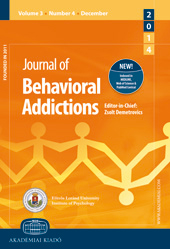‘Wanting’ and ‘liking’ skin picking: A validation of the Skin Picking Reward Scale
‘Wanting’ and ‘liking’ skin picking: A validation of the Skin Picking Reward Scale
Author(s): Ivar Snorrason, Ragnar P. Olafsson, David C. Houghton, Douglas W. Woods, Han-Joo LeeSubject(s): Cognitive Psychology, Neuropsychology, Behaviorism, Psychoanalysis, Substance abuse and addiction, Health and medicine and law
Published by: Akadémiai Kiadó
Keywords: skin picking; reward; incentive-sensitization theory; behavioral addiction; psychometric;
Summary/Abstract: Excoriation (skin-picking) disorder (SPD) is often conceptualized as a behavioral addiction in which aberrant reward processing may play an important role. The current study sought to develop a self-report instrument – the Skin Picking Reward Scale (SPRS) – that measures how strongly skin picking is ‘liked’ (i.e., the degree of pleasurable feelings while receiving the reward) and ‘wanted’ (i.e., the degree of the motivation to seek the reward). Methods: We administered the SPRS to individuals who endorsed excessive skin picking in online surveys and examined the scale’s factor structure (Studies 1 and 2). We then asked individuals with documented pathological skin picking to complete the SPRS and other relevant questionnaires on two occasions one week apart (Study 3). Results: Exploratory (Study 1; n = 330) and confirmatory (Study 2; n = 144) factor analyses consistently supported a two-factor structure reflecting the ‘liking’ and ‘wanting’ constructs. Results from Study 3 (N = 36) indicated that the Wanting and the Liking scales had adequate internal consistency and test–retest reliability. Additionally, consistent with predictions, the Wanting scale, but not the Liking scale, was associated with picking urges the following week, greater cue-reactivity, and more picking-related routines/habits. Discussion: These initial findings suggest that SPRS is a psychometrically sound measure of ‘wanting’ and ‘liking’ in pathological skin picking. The SPRS may facilitate research on reward processing anomalies in SPD and serve as a useful clinical instrument (e.g., to identify those at risk for cue-induced relapse).
Journal: Journal of Behavioral Addictions
- Issue Year: 4/2015
- Issue No: 4
- Page Range: 250-262
- Page Count: 13
- Language: English

